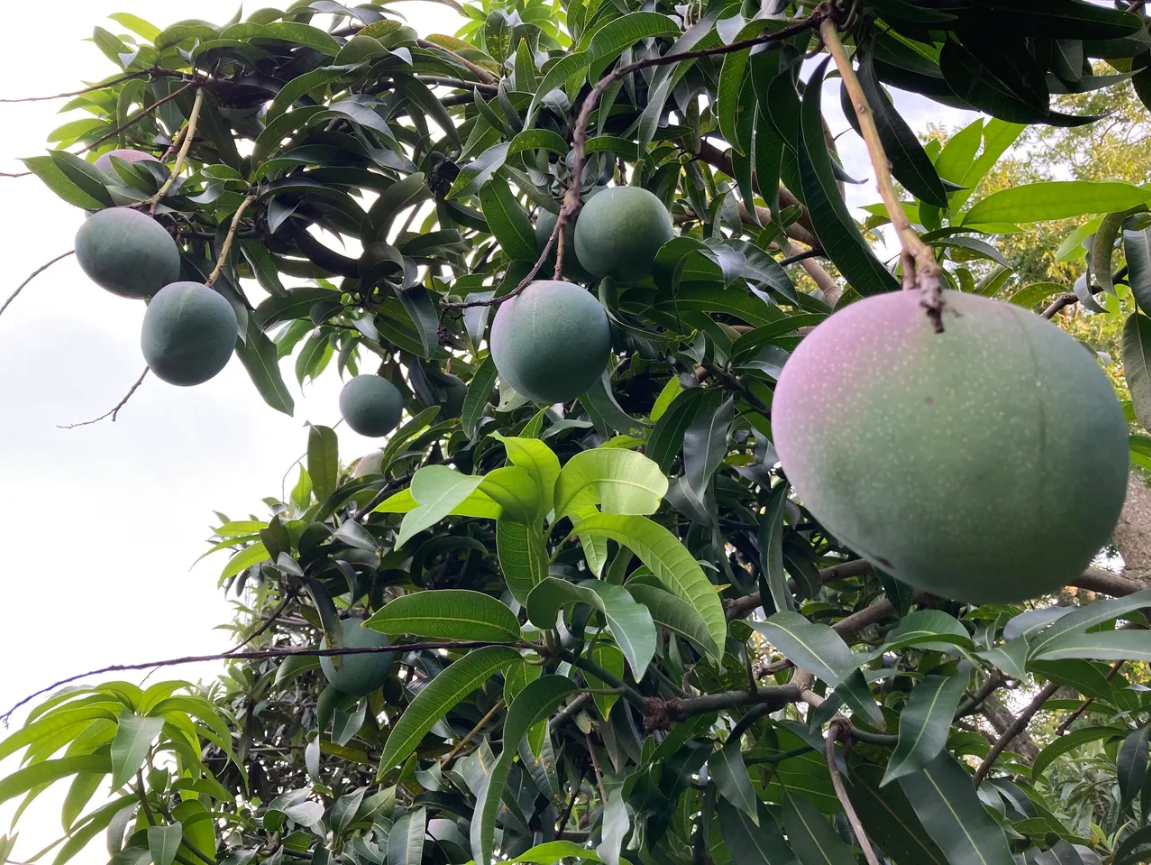Written by Dell deChant.
Collaborator: Tia Rowe
Welcome back to the mango-lovers and mango-curious alike! Our last article provided a taste of the growing popularity of mangos and shared that the University of Florida’s Institute of Food and Agricultural Sciences (known as “UF/IFAS”) is devoting its energy, resources, and genetic research to “growing the domestic mango industry in the Sunshine State” (IFAS report). Luckily, we don’t have to wait for UF/IFAS to grow Florida’s mango industry because there are already good ways to share Florida-grown mangos more widely and more sustainably. And, like the sweet delicious fruit this article is about, we can’t wait to share those ways with you!

Mangos may be unique in their tart and sweet taste, but systems for sharing mangos are not unique. As with all other food products, the key is localization. Mangos are an easily grown fruit whose local varieties are largely excluded from the diet of Floridians who, based on geography, should have easy access to the fruit. Most “fresh” food that is found in grocery stores travel an average of 1,500 miles per item to end up in our homes. That’s like driving from the southernmost point of the continental United States in Key West, Florida to New York City. As we explained in the las blog post (click here for link), mangos are coming to the United States from Mexico – all of them. As Haul Produce reports in its August 2024 newsletter: “Through the first six months of 2024 Mexico is the only origin currently exporting mangos to the U.S., with a total of 55,404,132 boxes for the season” (Haul Produce), and as noted in our last article the U.S. imports over 400,000 tons each year (The Packer, USDA report). To reach our area, those mangos from Mexico travel over 2,200 miles from Chiapas to Tampa Bay.
At this point you might be asking why we would be importing mangos from Mexico if they grow in Florida (you get an A+ if you did). Why would we not simply localize? After all, we know that there are mango orchards in the Tampa Bay area and in South Florida and that Florida is the largest mango-producing state in the U.S., with an estimated 60 million pounds harvested annually (AskIFAS/EDIS).

So, back again: Why not localize? There are three big obstacles that discourage sourcing local mangos:
1. The United States uses the industrial food system, which makes mangos (and all other foods) cheap and easy to acquire from unsustainable sources.
2. Governmental leaders (from local to national) offer few incentives to local food producers.
3. Education and media give little attention to the local food system, which leaves everyday consumers without the knowledge they need to support a sustainable local food system.
We will cover each of these issues in future blog posts in more detail and explore solutions to restore a thriving localized food system. But, for now, we are going to focus on the mighty mango before it goes out of season.
Farmnet is located in New Port Richey, Florida, which is in the Tampa Bay area on the west coast of the state. Here in our little town, mango production is up this year. Just south of here in St. Petersburg, however, local mango production is way down. This is surprising given that the city of St. Petersburg actually has something of a mango subculture. Last year, for example, had harvests of thousands of mangos and two small growers, alone, harvested over 5000 mangos. This year, unfortunately, has not been as fruitful (Tampa Bay Times).
While this year wasn’t as good of a harvest for St. Petersburg as last year, there is still a local food system that has been nurtured by local community members. There are growers in residential areas committed to growing this particular delicacy year after year. Neighbors and friends know about the trees, the fruit is made available at farmers markets, and are available to the community at other local points of distribution. Regardless of the harvest this year of last, The St. Petersburg story is one of successful localization and, though still young and developing, it offers a model for other communities to follow.

New Port Richey is also nurturing its own local mango culture. The one grove we care for has produced over 200 mangos (est. 400-500 pounds)- from just four trees that are still quite young. Every mango harvested went into the local foodshed. Some of those delicious local mangos made the half-mile trek to the local healthy food and juicing café (Gone Juicing), to a local market (Wright’s Natural Market), to FarmNet volunteers (don’t let anyone ever tell you it doesn’t pay to volunteer), and still more mangos to neighbors and friends. Our 200 local mangos are 200 mangos that did not travel over 2000 miles to reach us. These local mangos benefitted the local economy and local businesses. Our grove utilizes regenerative farming methods so, not only do these tantalizing and juicy mangos make people happy when they eat them, they are fresher, healthier, and more sustainable than the mangos being trucked-in as part of the industrial food system.
Local mangos tell a story about the town and people that grow them. They reflect the seasons and environmental changes we ourselves live through. They bring a smile to faces of our neighbors and friends as they partake in the juicy wonder that is a fresh and local mango. These local mangos and their story are a small example of the wonders of the natural world that surrounds us and nourishes us, and what is possible when a commitment is made to protect and promote such things. We are excited for you to join us on this journey of exploring the food system. This is how we localize the food system – season by season, story by story.

Bonus paragraph for our New Port Richey neighbors: There are still mangos on our trees, and we know there are other mangos on other trees nearby! So, if you have a mango tree, please let us know. If you know others who have trees, ask them to tell us about their trees. Share with us how many mangos you harvest. We’ll keep a record of the trees and the harvests. We will celebrate the good harvests with you and commiserate and problem solve the less-than-productive harvests with you. If you have more mangos than you can eat or share, please let us know and we will happily collect them to share with others. By next mango season we could have thousands of mangos in the foodshed, and more stories to tell!
Sources, Resources, & Research
(for more sources, see references in our previous Mango article)
https://edis.ifas.ufl.edu/publication/FE1115
https://haulproduce.com/2024/all-u-s-imports-of-mangoes-currently-coming-from-mexico
https://www.tampabay.com/news/florida/2023/07/11/mango-ripe-tree-grow-yard-tropical-fruit


Leave a Reply